Psychology Case Study: Analyzing Attachment and Parenting - Rebecca
VerifiedAdded on 2023/04/20
|8
|2085
|296
Case Study
AI Summary
This case study delves into the psychological aspects of Rebecca's development, primarily focusing on her attachment style and the parenting approach employed by Mrs. Hermann. The analysis suggests that Rebecca exhibits an insecure anxious-ambivalent attachment, stemming from inconsistent parental responses during her childhood. Mrs. Hermann's parenting style is identified as authoritarian, characterized by high demands and low responsiveness, potentially contributing to Rebecca's passivity and later developmental challenges. The case study also references research that links authoritarian parenting to increased rates of depression in youth, highlighting the long-term impact of parenting styles on child mental health. The document provides a comprehensive overview of attachment theory, parenting typologies, and the potential consequences of different parenting approaches, while also critically evaluating a research article on the association between authoritarian parenting and youth depression. Desklib offers a platform for students to access similar solved assignments and study resources.
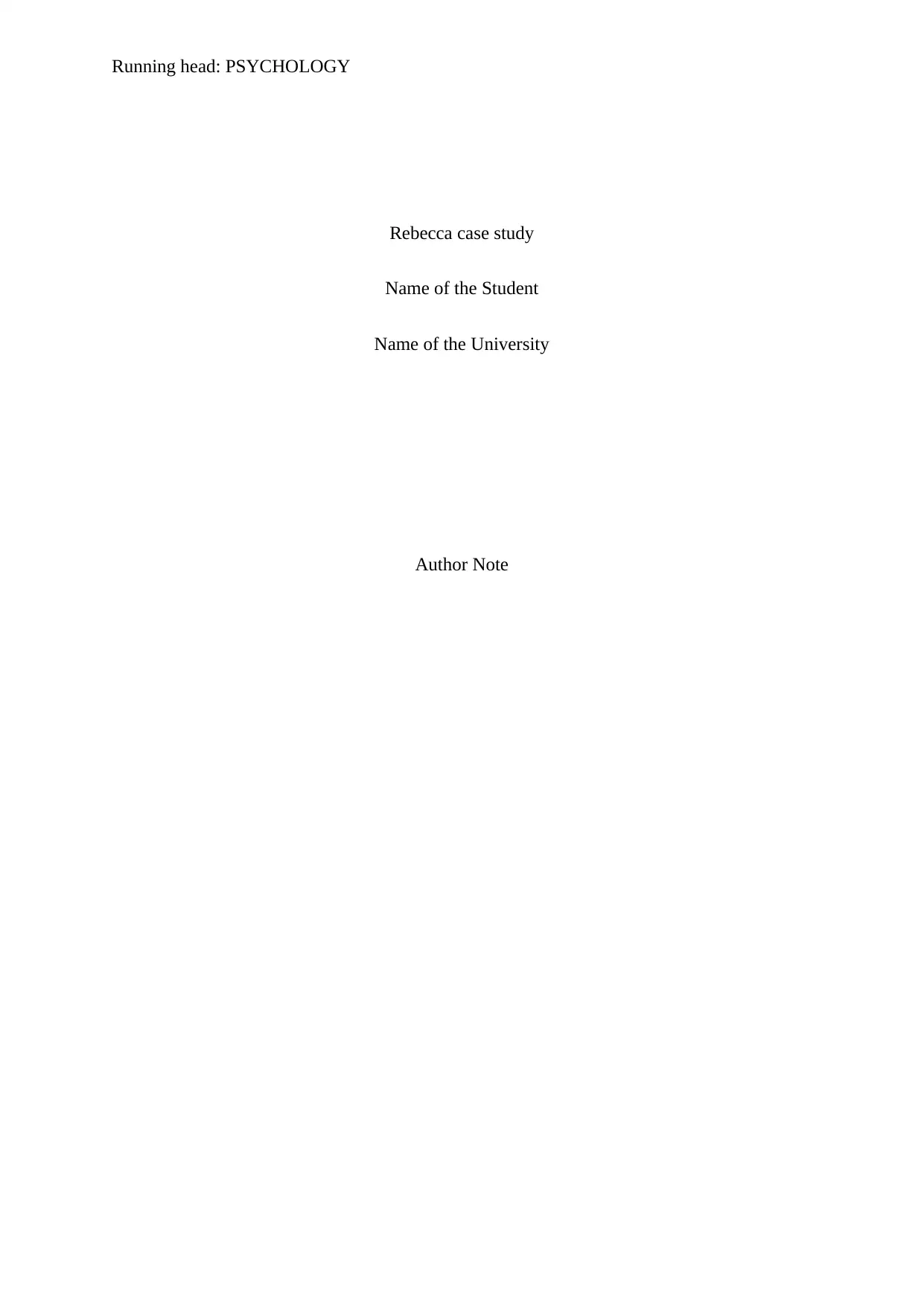
Running head: PSYCHOLOGY
Rebecca case study
Name of the Student
Name of the University
Author Note
Rebecca case study
Name of the Student
Name of the University
Author Note
Paraphrase This Document
Need a fresh take? Get an instant paraphrase of this document with our AI Paraphraser
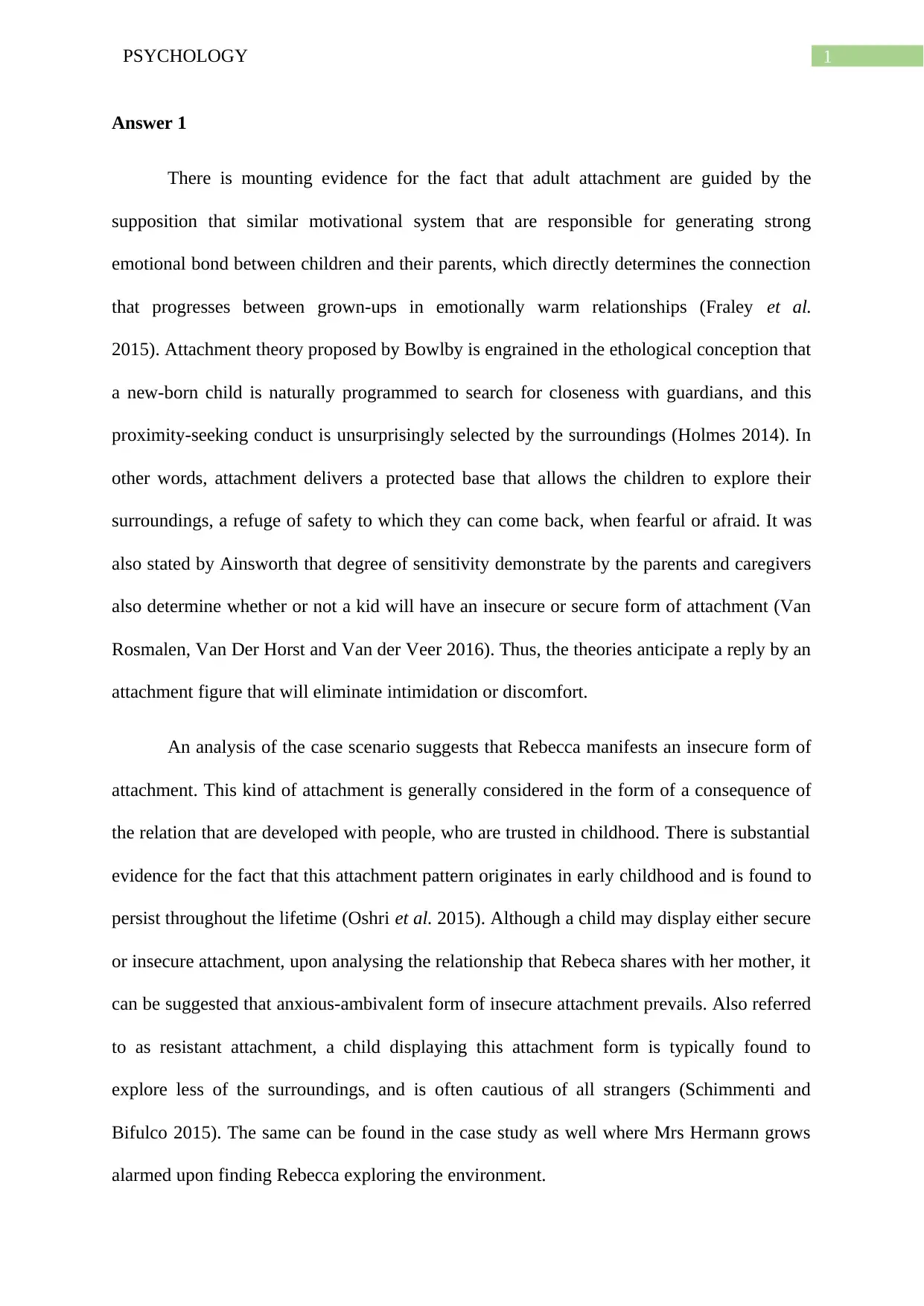
1PSYCHOLOGY
Answer 1
There is mounting evidence for the fact that adult attachment are guided by the
supposition that similar motivational system that are responsible for generating strong
emotional bond between children and their parents, which directly determines the connection
that progresses between grown-ups in emotionally warm relationships (Fraley et al.
2015). Attachment theory proposed by Bowlby is engrained in the ethological conception that
a new-born child is naturally programmed to search for closeness with guardians, and this
proximity-seeking conduct is unsurprisingly selected by the surroundings (Holmes 2014). In
other words, attachment delivers a protected base that allows the children to explore their
surroundings, a refuge of safety to which they can come back, when fearful or afraid. It was
also stated by Ainsworth that degree of sensitivity demonstrate by the parents and caregivers
also determine whether or not a kid will have an insecure or secure form of attachment (Van
Rosmalen, Van Der Horst and Van der Veer 2016). Thus, the theories anticipate a reply by an
attachment figure that will eliminate intimidation or discomfort.
An analysis of the case scenario suggests that Rebecca manifests an insecure form of
attachment. This kind of attachment is generally considered in the form of a consequence of
the relation that are developed with people, who are trusted in childhood. There is substantial
evidence for the fact that this attachment pattern originates in early childhood and is found to
persist throughout the lifetime (Oshri et al. 2015). Although a child may display either secure
or insecure attachment, upon analysing the relationship that Rebeca shares with her mother, it
can be suggested that anxious-ambivalent form of insecure attachment prevails. Also referred
to as resistant attachment, a child displaying this attachment form is typically found to
explore less of the surroundings, and is often cautious of all strangers (Schimmenti and
Bifulco 2015). The same can be found in the case study as well where Mrs Hermann grows
alarmed upon finding Rebecca exploring the environment.
Answer 1
There is mounting evidence for the fact that adult attachment are guided by the
supposition that similar motivational system that are responsible for generating strong
emotional bond between children and their parents, which directly determines the connection
that progresses between grown-ups in emotionally warm relationships (Fraley et al.
2015). Attachment theory proposed by Bowlby is engrained in the ethological conception that
a new-born child is naturally programmed to search for closeness with guardians, and this
proximity-seeking conduct is unsurprisingly selected by the surroundings (Holmes 2014). In
other words, attachment delivers a protected base that allows the children to explore their
surroundings, a refuge of safety to which they can come back, when fearful or afraid. It was
also stated by Ainsworth that degree of sensitivity demonstrate by the parents and caregivers
also determine whether or not a kid will have an insecure or secure form of attachment (Van
Rosmalen, Van Der Horst and Van der Veer 2016). Thus, the theories anticipate a reply by an
attachment figure that will eliminate intimidation or discomfort.
An analysis of the case scenario suggests that Rebecca manifests an insecure form of
attachment. This kind of attachment is generally considered in the form of a consequence of
the relation that are developed with people, who are trusted in childhood. There is substantial
evidence for the fact that this attachment pattern originates in early childhood and is found to
persist throughout the lifetime (Oshri et al. 2015). Although a child may display either secure
or insecure attachment, upon analysing the relationship that Rebeca shares with her mother, it
can be suggested that anxious-ambivalent form of insecure attachment prevails. Also referred
to as resistant attachment, a child displaying this attachment form is typically found to
explore less of the surroundings, and is often cautious of all strangers (Schimmenti and
Bifulco 2015). The same can be found in the case study as well where Mrs Hermann grows
alarmed upon finding Rebecca exploring the environment.
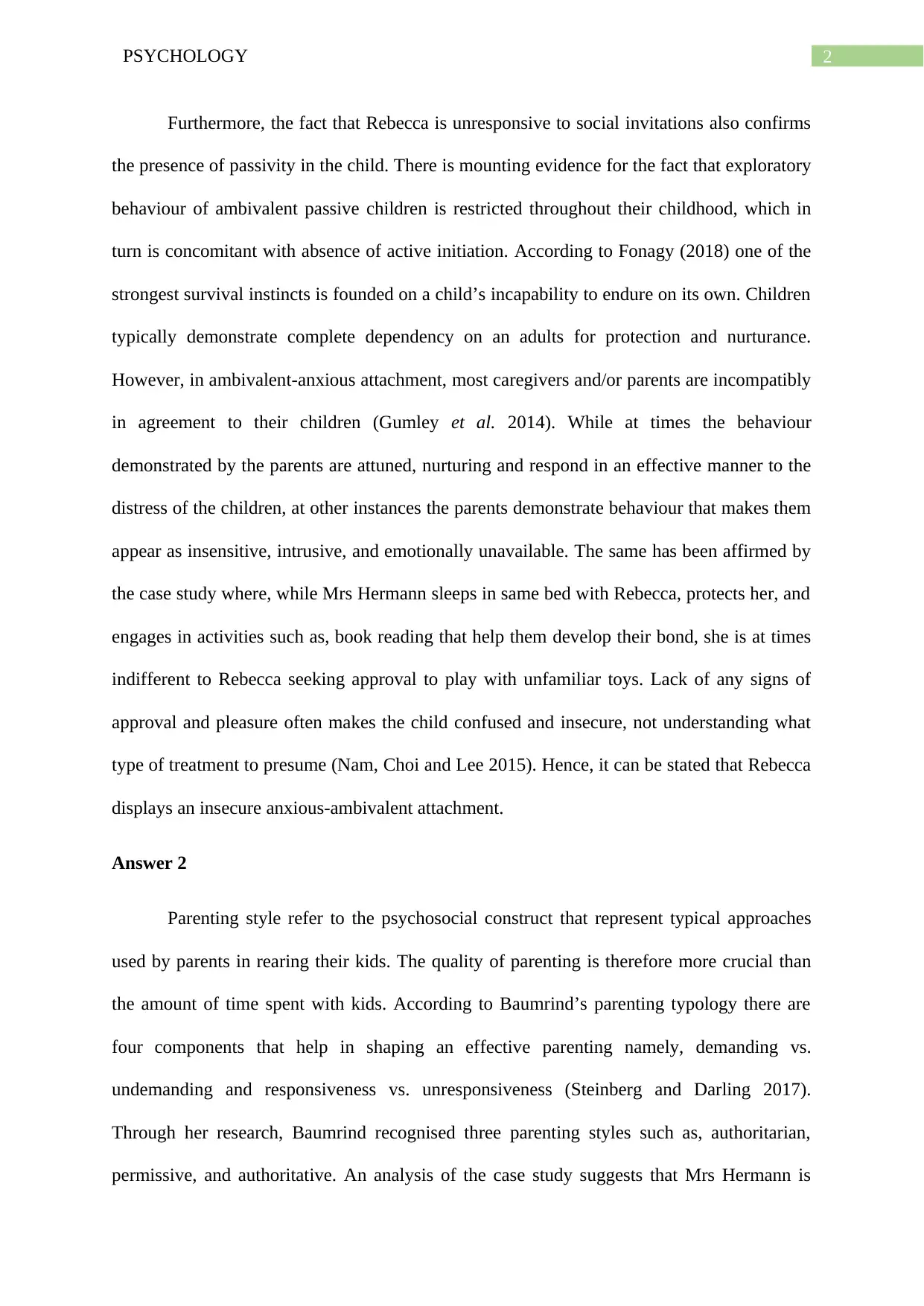
2PSYCHOLOGY
Furthermore, the fact that Rebecca is unresponsive to social invitations also confirms
the presence of passivity in the child. There is mounting evidence for the fact that exploratory
behaviour of ambivalent passive children is restricted throughout their childhood, which in
turn is concomitant with absence of active initiation. According to Fonagy (2018) one of the
strongest survival instincts is founded on a child’s incapability to endure on its own. Children
typically demonstrate complete dependency on an adults for protection and nurturance.
However, in ambivalent-anxious attachment, most caregivers and/or parents are incompatibly
in agreement to their children (Gumley et al. 2014). While at times the behaviour
demonstrated by the parents are attuned, nurturing and respond in an effective manner to the
distress of the children, at other instances the parents demonstrate behaviour that makes them
appear as insensitive, intrusive, and emotionally unavailable. The same has been affirmed by
the case study where, while Mrs Hermann sleeps in same bed with Rebecca, protects her, and
engages in activities such as, book reading that help them develop their bond, she is at times
indifferent to Rebecca seeking approval to play with unfamiliar toys. Lack of any signs of
approval and pleasure often makes the child confused and insecure, not understanding what
type of treatment to presume (Nam, Choi and Lee 2015). Hence, it can be stated that Rebecca
displays an insecure anxious-ambivalent attachment.
Answer 2
Parenting style refer to the psychosocial construct that represent typical approaches
used by parents in rearing their kids. The quality of parenting is therefore more crucial than
the amount of time spent with kids. According to Baumrind’s parenting typology there are
four components that help in shaping an effective parenting namely, demanding vs.
undemanding and responsiveness vs. unresponsiveness (Steinberg and Darling 2017).
Through her research, Baumrind recognised three parenting styles such as, authoritarian,
permissive, and authoritative. An analysis of the case study suggests that Mrs Hermann is
Furthermore, the fact that Rebecca is unresponsive to social invitations also confirms
the presence of passivity in the child. There is mounting evidence for the fact that exploratory
behaviour of ambivalent passive children is restricted throughout their childhood, which in
turn is concomitant with absence of active initiation. According to Fonagy (2018) one of the
strongest survival instincts is founded on a child’s incapability to endure on its own. Children
typically demonstrate complete dependency on an adults for protection and nurturance.
However, in ambivalent-anxious attachment, most caregivers and/or parents are incompatibly
in agreement to their children (Gumley et al. 2014). While at times the behaviour
demonstrated by the parents are attuned, nurturing and respond in an effective manner to the
distress of the children, at other instances the parents demonstrate behaviour that makes them
appear as insensitive, intrusive, and emotionally unavailable. The same has been affirmed by
the case study where, while Mrs Hermann sleeps in same bed with Rebecca, protects her, and
engages in activities such as, book reading that help them develop their bond, she is at times
indifferent to Rebecca seeking approval to play with unfamiliar toys. Lack of any signs of
approval and pleasure often makes the child confused and insecure, not understanding what
type of treatment to presume (Nam, Choi and Lee 2015). Hence, it can be stated that Rebecca
displays an insecure anxious-ambivalent attachment.
Answer 2
Parenting style refer to the psychosocial construct that represent typical approaches
used by parents in rearing their kids. The quality of parenting is therefore more crucial than
the amount of time spent with kids. According to Baumrind’s parenting typology there are
four components that help in shaping an effective parenting namely, demanding vs.
undemanding and responsiveness vs. unresponsiveness (Steinberg and Darling 2017).
Through her research, Baumrind recognised three parenting styles such as, authoritarian,
permissive, and authoritative. An analysis of the case study suggests that Mrs Hermann is
⊘ This is a preview!⊘
Do you want full access?
Subscribe today to unlock all pages.

Trusted by 1+ million students worldwide
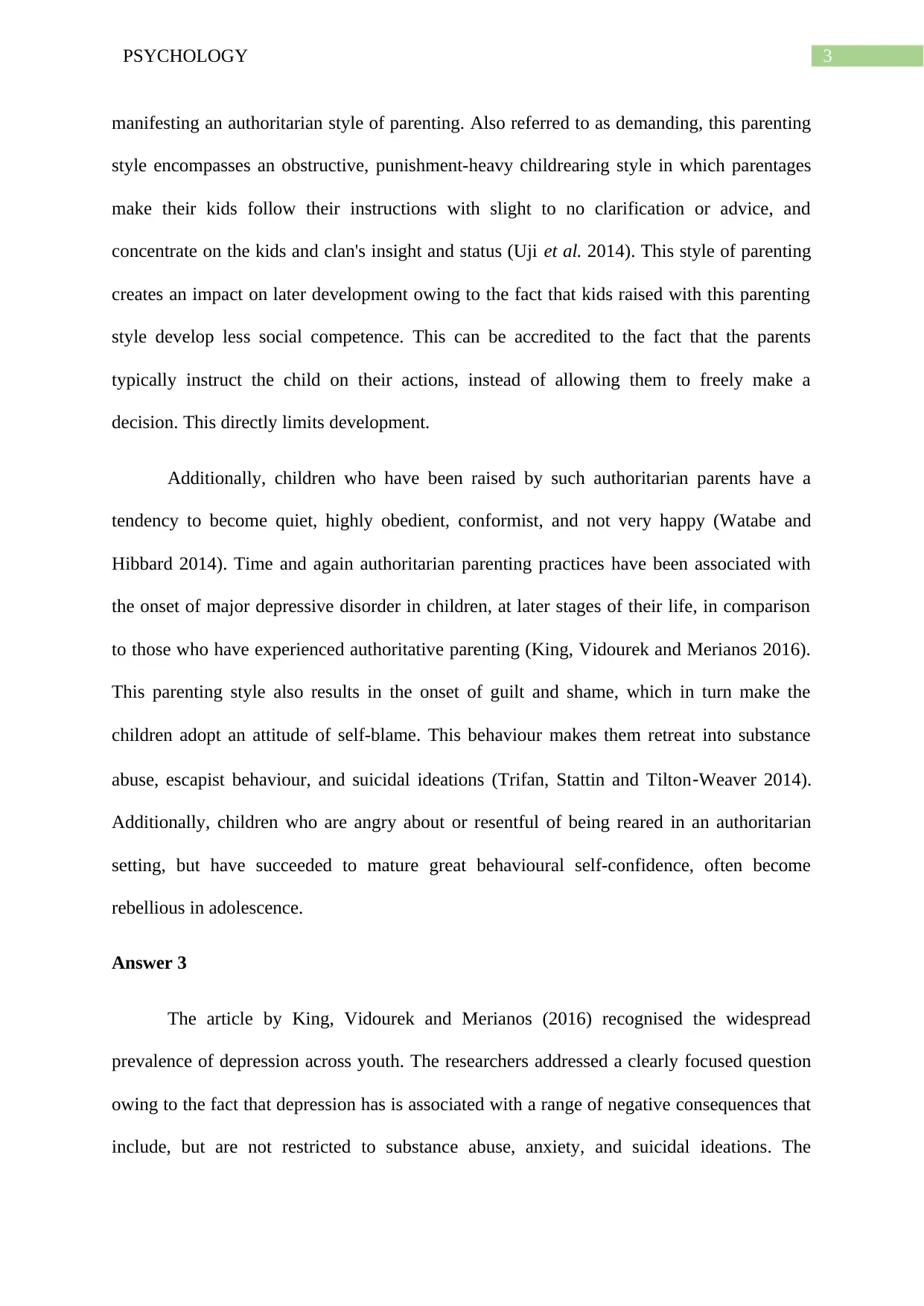
3PSYCHOLOGY
manifesting an authoritarian style of parenting. Also referred to as demanding, this parenting
style encompasses an obstructive, punishment-heavy childrearing style in which parentages
make their kids follow their instructions with slight to no clarification or advice, and
concentrate on the kids and clan's insight and status (Uji et al. 2014). This style of parenting
creates an impact on later development owing to the fact that kids raised with this parenting
style develop less social competence. This can be accredited to the fact that the parents
typically instruct the child on their actions, instead of allowing them to freely make a
decision. This directly limits development.
Additionally, children who have been raised by such authoritarian parents have a
tendency to become quiet, highly obedient, conformist, and not very happy (Watabe and
Hibbard 2014). Time and again authoritarian parenting practices have been associated with
the onset of major depressive disorder in children, at later stages of their life, in comparison
to those who have experienced authoritative parenting (King, Vidourek and Merianos 2016).
This parenting style also results in the onset of guilt and shame, which in turn make the
children adopt an attitude of self-blame. This behaviour makes them retreat into substance
abuse, escapist behaviour, and suicidal ideations (Trifan, Stattin and Tilton‐Weaver 2014).
Additionally, children who are angry about or resentful of being reared in an authoritarian
setting, but have succeeded to mature great behavioural self-confidence, often become
rebellious in adolescence.
Answer 3
The article by King, Vidourek and Merianos (2016) recognised the widespread
prevalence of depression across youth. The researchers addressed a clearly focused question
owing to the fact that depression has is associated with a range of negative consequences that
include, but are not restricted to substance abuse, anxiety, and suicidal ideations. The
manifesting an authoritarian style of parenting. Also referred to as demanding, this parenting
style encompasses an obstructive, punishment-heavy childrearing style in which parentages
make their kids follow their instructions with slight to no clarification or advice, and
concentrate on the kids and clan's insight and status (Uji et al. 2014). This style of parenting
creates an impact on later development owing to the fact that kids raised with this parenting
style develop less social competence. This can be accredited to the fact that the parents
typically instruct the child on their actions, instead of allowing them to freely make a
decision. This directly limits development.
Additionally, children who have been raised by such authoritarian parents have a
tendency to become quiet, highly obedient, conformist, and not very happy (Watabe and
Hibbard 2014). Time and again authoritarian parenting practices have been associated with
the onset of major depressive disorder in children, at later stages of their life, in comparison
to those who have experienced authoritative parenting (King, Vidourek and Merianos 2016).
This parenting style also results in the onset of guilt and shame, which in turn make the
children adopt an attitude of self-blame. This behaviour makes them retreat into substance
abuse, escapist behaviour, and suicidal ideations (Trifan, Stattin and Tilton‐Weaver 2014).
Additionally, children who are angry about or resentful of being reared in an authoritarian
setting, but have succeeded to mature great behavioural self-confidence, often become
rebellious in adolescence.
Answer 3
The article by King, Vidourek and Merianos (2016) recognised the widespread
prevalence of depression across youth. The researchers addressed a clearly focused question
owing to the fact that depression has is associated with a range of negative consequences that
include, but are not restricted to substance abuse, anxiety, and suicidal ideations. The
Paraphrase This Document
Need a fresh take? Get an instant paraphrase of this document with our AI Paraphraser
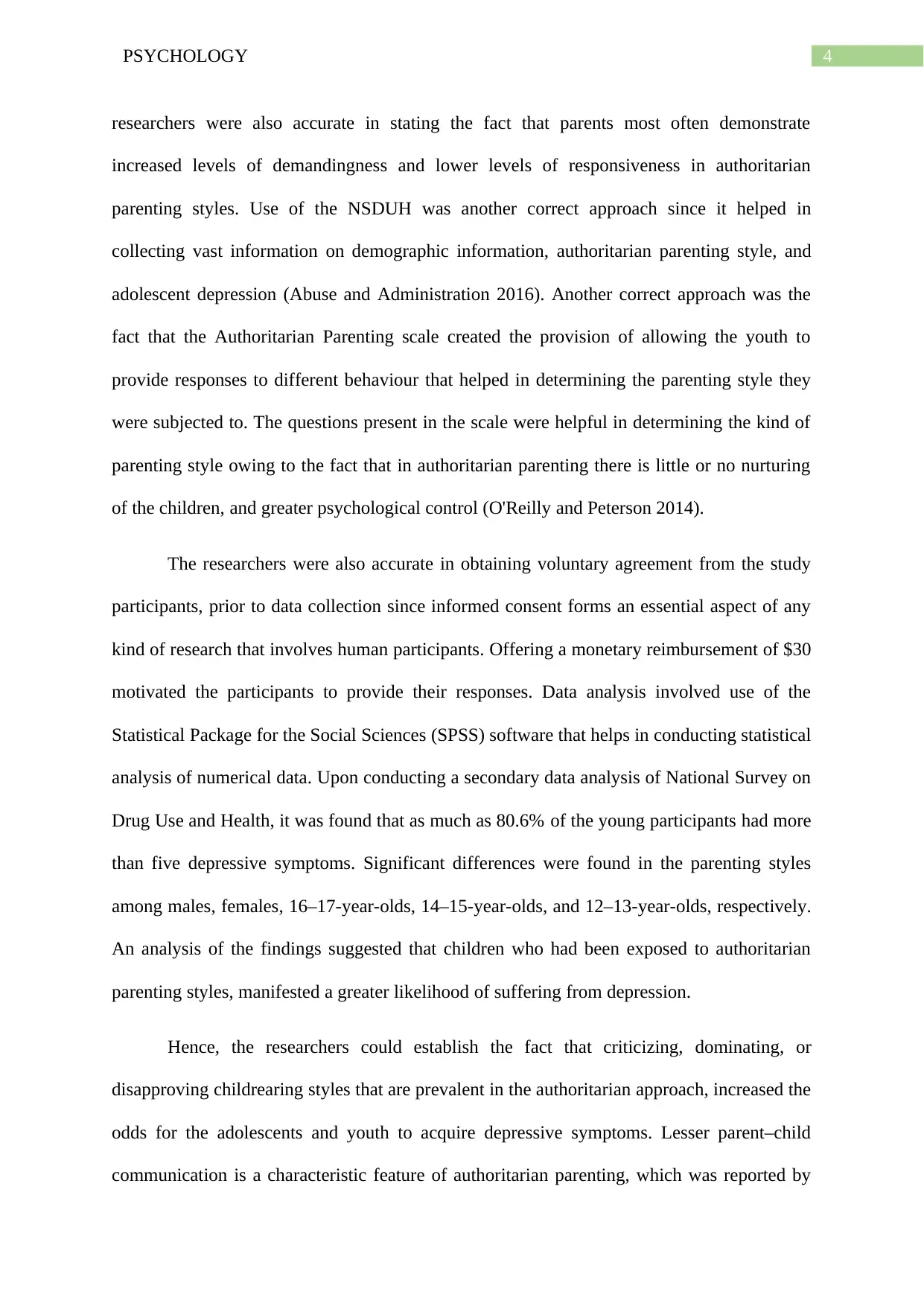
4PSYCHOLOGY
researchers were also accurate in stating the fact that parents most often demonstrate
increased levels of demandingness and lower levels of responsiveness in authoritarian
parenting styles. Use of the NSDUH was another correct approach since it helped in
collecting vast information on demographic information, authoritarian parenting style, and
adolescent depression (Abuse and Administration 2016). Another correct approach was the
fact that the Authoritarian Parenting scale created the provision of allowing the youth to
provide responses to different behaviour that helped in determining the parenting style they
were subjected to. The questions present in the scale were helpful in determining the kind of
parenting style owing to the fact that in authoritarian parenting there is little or no nurturing
of the children, and greater psychological control (O'Reilly and Peterson 2014).
The researchers were also accurate in obtaining voluntary agreement from the study
participants, prior to data collection since informed consent forms an essential aspect of any
kind of research that involves human participants. Offering a monetary reimbursement of $30
motivated the participants to provide their responses. Data analysis involved use of the
Statistical Package for the Social Sciences (SPSS) software that helps in conducting statistical
analysis of numerical data. Upon conducting a secondary data analysis of National Survey on
Drug Use and Health, it was found that as much as 80.6% of the young participants had more
than five depressive symptoms. Significant differences were found in the parenting styles
among males, females, 16–17-year-olds, 14–15-year-olds, and 12–13-year-olds, respectively.
An analysis of the findings suggested that children who had been exposed to authoritarian
parenting styles, manifested a greater likelihood of suffering from depression.
Hence, the researchers could establish the fact that criticizing, dominating, or
disapproving childrearing styles that are prevalent in the authoritarian approach, increased the
odds for the adolescents and youth to acquire depressive symptoms. Lesser parent–child
communication is a characteristic feature of authoritarian parenting, which was reported by
researchers were also accurate in stating the fact that parents most often demonstrate
increased levels of demandingness and lower levels of responsiveness in authoritarian
parenting styles. Use of the NSDUH was another correct approach since it helped in
collecting vast information on demographic information, authoritarian parenting style, and
adolescent depression (Abuse and Administration 2016). Another correct approach was the
fact that the Authoritarian Parenting scale created the provision of allowing the youth to
provide responses to different behaviour that helped in determining the parenting style they
were subjected to. The questions present in the scale were helpful in determining the kind of
parenting style owing to the fact that in authoritarian parenting there is little or no nurturing
of the children, and greater psychological control (O'Reilly and Peterson 2014).
The researchers were also accurate in obtaining voluntary agreement from the study
participants, prior to data collection since informed consent forms an essential aspect of any
kind of research that involves human participants. Offering a monetary reimbursement of $30
motivated the participants to provide their responses. Data analysis involved use of the
Statistical Package for the Social Sciences (SPSS) software that helps in conducting statistical
analysis of numerical data. Upon conducting a secondary data analysis of National Survey on
Drug Use and Health, it was found that as much as 80.6% of the young participants had more
than five depressive symptoms. Significant differences were found in the parenting styles
among males, females, 16–17-year-olds, 14–15-year-olds, and 12–13-year-olds, respectively.
An analysis of the findings suggested that children who had been exposed to authoritarian
parenting styles, manifested a greater likelihood of suffering from depression.
Hence, the researchers could establish the fact that criticizing, dominating, or
disapproving childrearing styles that are prevalent in the authoritarian approach, increased the
odds for the adolescents and youth to acquire depressive symptoms. Lesser parent–child
communication is a characteristic feature of authoritarian parenting, which was reported by
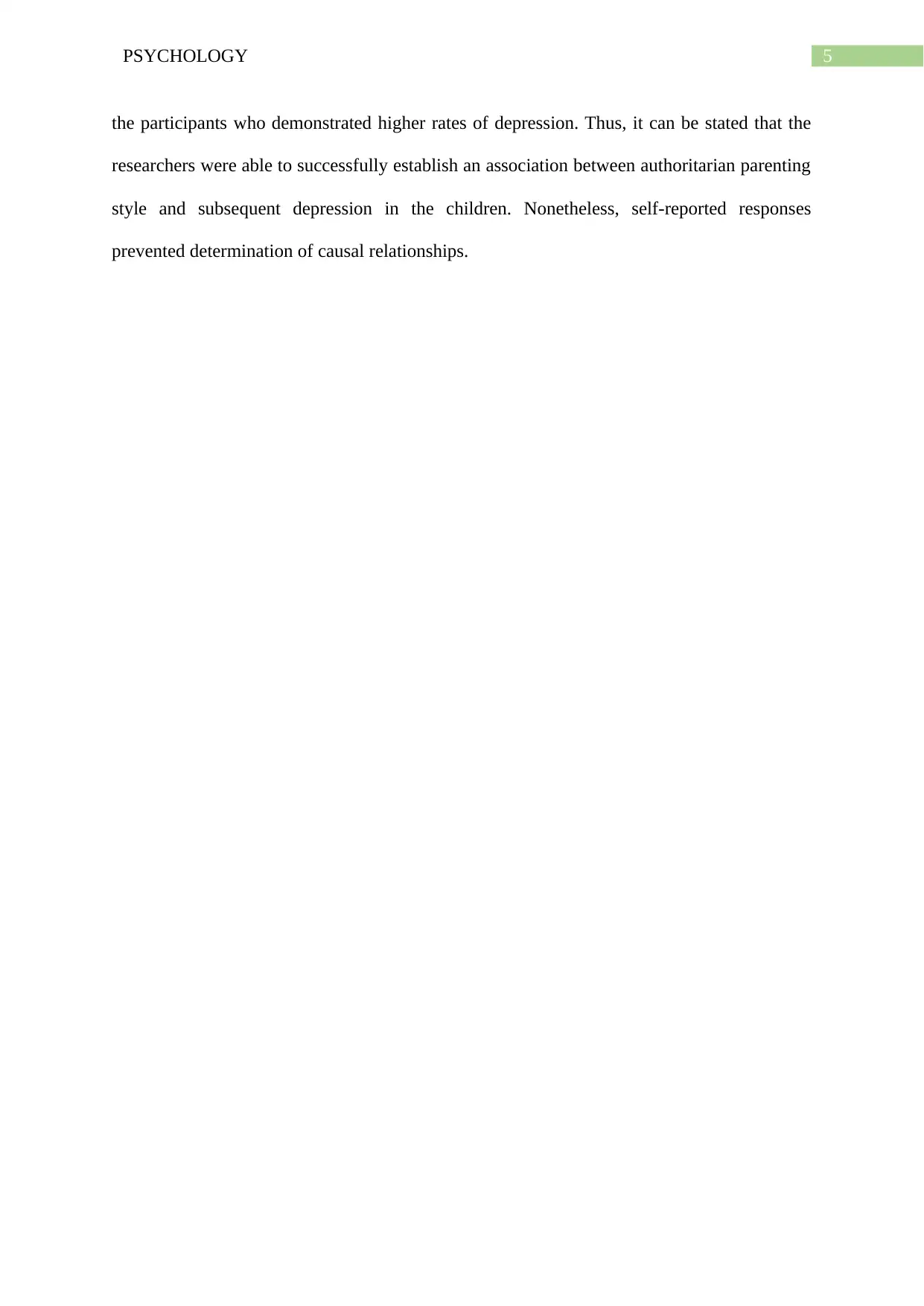
5PSYCHOLOGY
the participants who demonstrated higher rates of depression. Thus, it can be stated that the
researchers were able to successfully establish an association between authoritarian parenting
style and subsequent depression in the children. Nonetheless, self-reported responses
prevented determination of causal relationships.
the participants who demonstrated higher rates of depression. Thus, it can be stated that the
researchers were able to successfully establish an association between authoritarian parenting
style and subsequent depression in the children. Nonetheless, self-reported responses
prevented determination of causal relationships.
⊘ This is a preview!⊘
Do you want full access?
Subscribe today to unlock all pages.

Trusted by 1+ million students worldwide
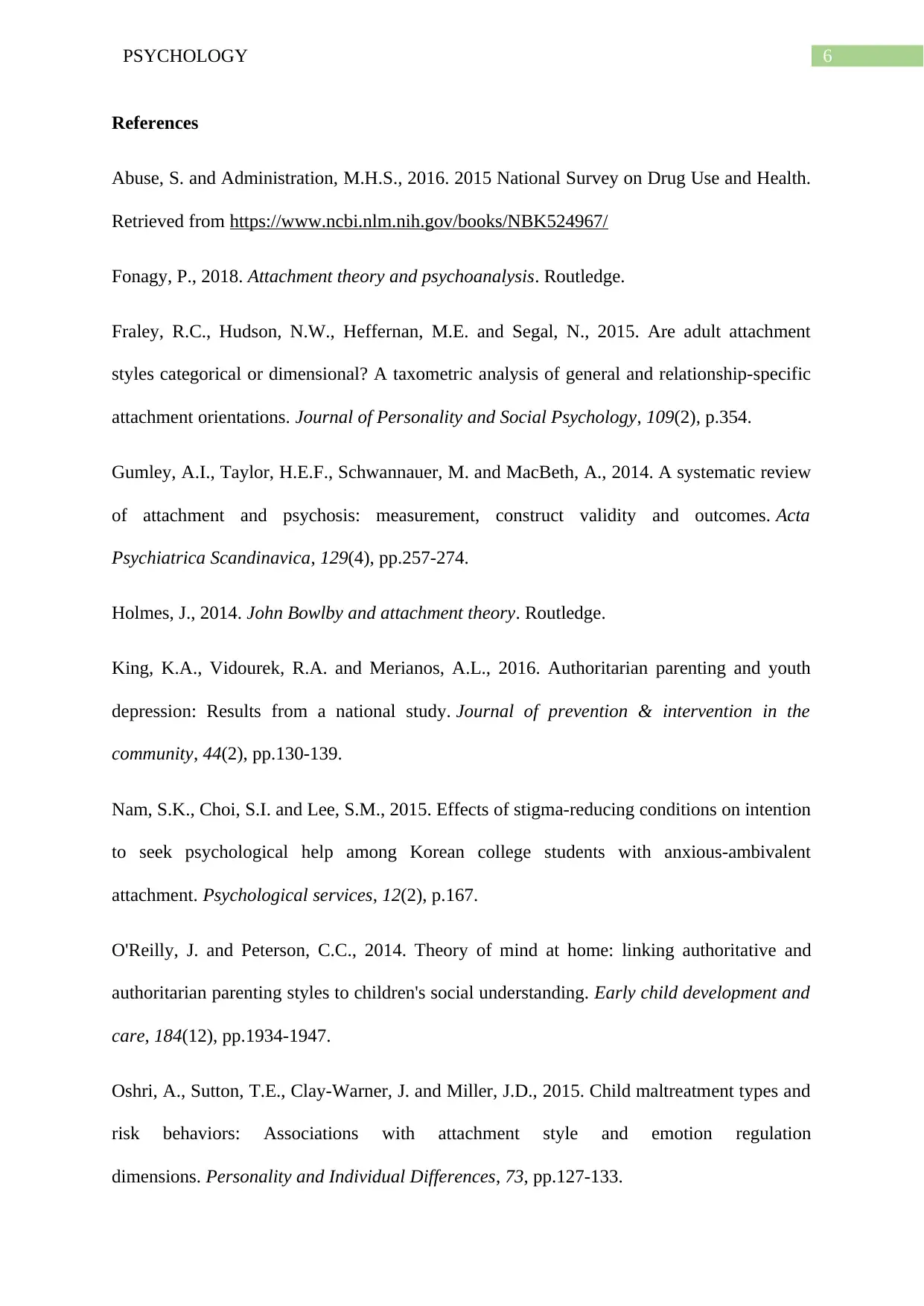
6PSYCHOLOGY
References
Abuse, S. and Administration, M.H.S., 2016. 2015 National Survey on Drug Use and Health.
Retrieved from https://www.ncbi.nlm.nih.gov/books/NBK524967/
Fonagy, P., 2018. Attachment theory and psychoanalysis. Routledge.
Fraley, R.C., Hudson, N.W., Heffernan, M.E. and Segal, N., 2015. Are adult attachment
styles categorical or dimensional? A taxometric analysis of general and relationship-specific
attachment orientations. Journal of Personality and Social Psychology, 109(2), p.354.
Gumley, A.I., Taylor, H.E.F., Schwannauer, M. and MacBeth, A., 2014. A systematic review
of attachment and psychosis: measurement, construct validity and outcomes. Acta
Psychiatrica Scandinavica, 129(4), pp.257-274.
Holmes, J., 2014. John Bowlby and attachment theory. Routledge.
King, K.A., Vidourek, R.A. and Merianos, A.L., 2016. Authoritarian parenting and youth
depression: Results from a national study. Journal of prevention & intervention in the
community, 44(2), pp.130-139.
Nam, S.K., Choi, S.I. and Lee, S.M., 2015. Effects of stigma-reducing conditions on intention
to seek psychological help among Korean college students with anxious-ambivalent
attachment. Psychological services, 12(2), p.167.
O'Reilly, J. and Peterson, C.C., 2014. Theory of mind at home: linking authoritative and
authoritarian parenting styles to children's social understanding. Early child development and
care, 184(12), pp.1934-1947.
Oshri, A., Sutton, T.E., Clay-Warner, J. and Miller, J.D., 2015. Child maltreatment types and
risk behaviors: Associations with attachment style and emotion regulation
dimensions. Personality and Individual Differences, 73, pp.127-133.
References
Abuse, S. and Administration, M.H.S., 2016. 2015 National Survey on Drug Use and Health.
Retrieved from https://www.ncbi.nlm.nih.gov/books/NBK524967/
Fonagy, P., 2018. Attachment theory and psychoanalysis. Routledge.
Fraley, R.C., Hudson, N.W., Heffernan, M.E. and Segal, N., 2015. Are adult attachment
styles categorical or dimensional? A taxometric analysis of general and relationship-specific
attachment orientations. Journal of Personality and Social Psychology, 109(2), p.354.
Gumley, A.I., Taylor, H.E.F., Schwannauer, M. and MacBeth, A., 2014. A systematic review
of attachment and psychosis: measurement, construct validity and outcomes. Acta
Psychiatrica Scandinavica, 129(4), pp.257-274.
Holmes, J., 2014. John Bowlby and attachment theory. Routledge.
King, K.A., Vidourek, R.A. and Merianos, A.L., 2016. Authoritarian parenting and youth
depression: Results from a national study. Journal of prevention & intervention in the
community, 44(2), pp.130-139.
Nam, S.K., Choi, S.I. and Lee, S.M., 2015. Effects of stigma-reducing conditions on intention
to seek psychological help among Korean college students with anxious-ambivalent
attachment. Psychological services, 12(2), p.167.
O'Reilly, J. and Peterson, C.C., 2014. Theory of mind at home: linking authoritative and
authoritarian parenting styles to children's social understanding. Early child development and
care, 184(12), pp.1934-1947.
Oshri, A., Sutton, T.E., Clay-Warner, J. and Miller, J.D., 2015. Child maltreatment types and
risk behaviors: Associations with attachment style and emotion regulation
dimensions. Personality and Individual Differences, 73, pp.127-133.
Paraphrase This Document
Need a fresh take? Get an instant paraphrase of this document with our AI Paraphraser
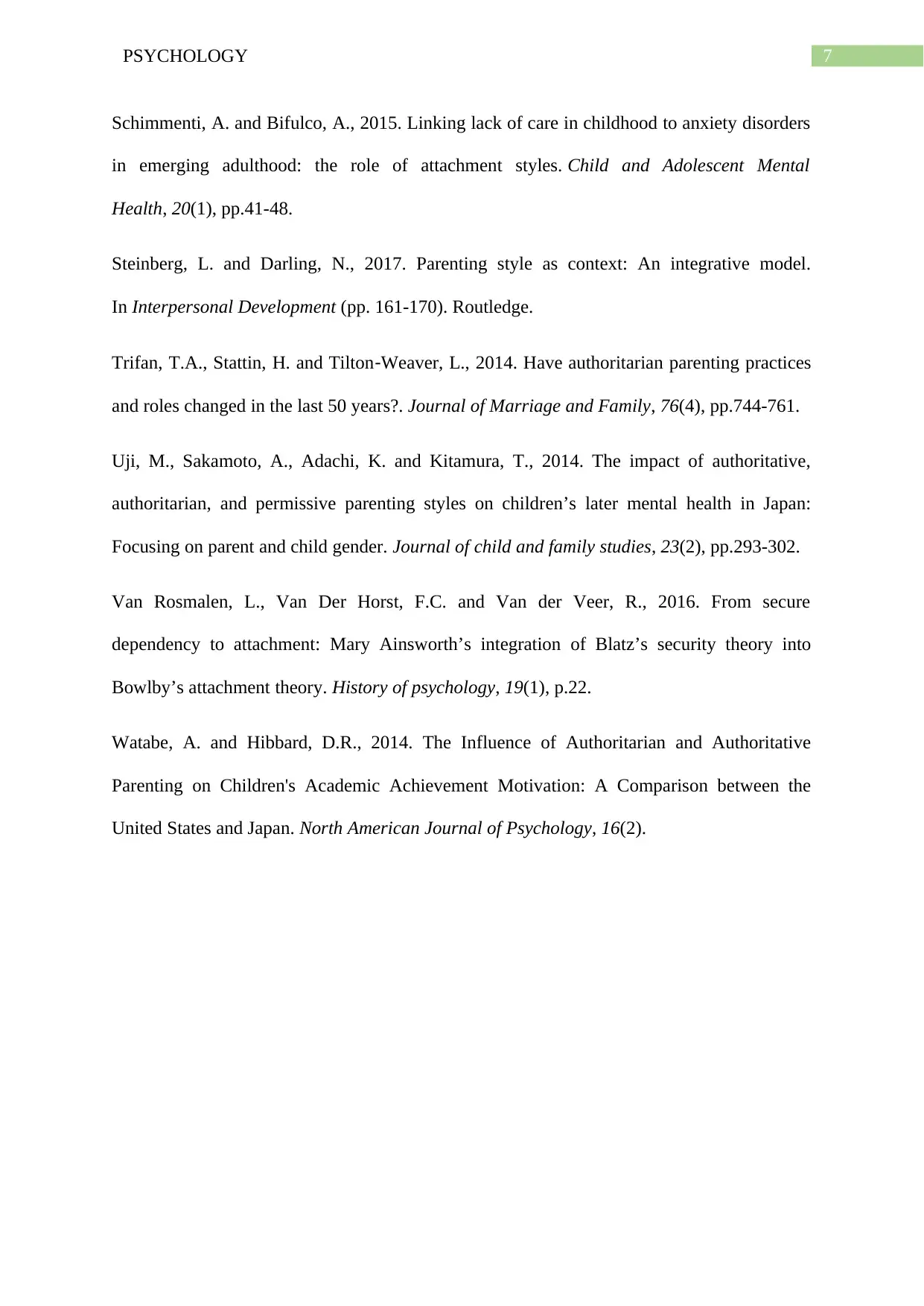
7PSYCHOLOGY
Schimmenti, A. and Bifulco, A., 2015. Linking lack of care in childhood to anxiety disorders
in emerging adulthood: the role of attachment styles. Child and Adolescent Mental
Health, 20(1), pp.41-48.
Steinberg, L. and Darling, N., 2017. Parenting style as context: An integrative model.
In Interpersonal Development (pp. 161-170). Routledge.
Trifan, T.A., Stattin, H. and Tilton‐Weaver, L., 2014. Have authoritarian parenting practices
and roles changed in the last 50 years?. Journal of Marriage and Family, 76(4), pp.744-761.
Uji, M., Sakamoto, A., Adachi, K. and Kitamura, T., 2014. The impact of authoritative,
authoritarian, and permissive parenting styles on children’s later mental health in Japan:
Focusing on parent and child gender. Journal of child and family studies, 23(2), pp.293-302.
Van Rosmalen, L., Van Der Horst, F.C. and Van der Veer, R., 2016. From secure
dependency to attachment: Mary Ainsworth’s integration of Blatz’s security theory into
Bowlby’s attachment theory. History of psychology, 19(1), p.22.
Watabe, A. and Hibbard, D.R., 2014. The Influence of Authoritarian and Authoritative
Parenting on Children's Academic Achievement Motivation: A Comparison between the
United States and Japan. North American Journal of Psychology, 16(2).
Schimmenti, A. and Bifulco, A., 2015. Linking lack of care in childhood to anxiety disorders
in emerging adulthood: the role of attachment styles. Child and Adolescent Mental
Health, 20(1), pp.41-48.
Steinberg, L. and Darling, N., 2017. Parenting style as context: An integrative model.
In Interpersonal Development (pp. 161-170). Routledge.
Trifan, T.A., Stattin, H. and Tilton‐Weaver, L., 2014. Have authoritarian parenting practices
and roles changed in the last 50 years?. Journal of Marriage and Family, 76(4), pp.744-761.
Uji, M., Sakamoto, A., Adachi, K. and Kitamura, T., 2014. The impact of authoritative,
authoritarian, and permissive parenting styles on children’s later mental health in Japan:
Focusing on parent and child gender. Journal of child and family studies, 23(2), pp.293-302.
Van Rosmalen, L., Van Der Horst, F.C. and Van der Veer, R., 2016. From secure
dependency to attachment: Mary Ainsworth’s integration of Blatz’s security theory into
Bowlby’s attachment theory. History of psychology, 19(1), p.22.
Watabe, A. and Hibbard, D.R., 2014. The Influence of Authoritarian and Authoritative
Parenting on Children's Academic Achievement Motivation: A Comparison between the
United States and Japan. North American Journal of Psychology, 16(2).
1 out of 8
Related Documents
Your All-in-One AI-Powered Toolkit for Academic Success.
+13062052269
info@desklib.com
Available 24*7 on WhatsApp / Email
![[object Object]](/_next/static/media/star-bottom.7253800d.svg)
Unlock your academic potential
Copyright © 2020–2026 A2Z Services. All Rights Reserved. Developed and managed by ZUCOL.





